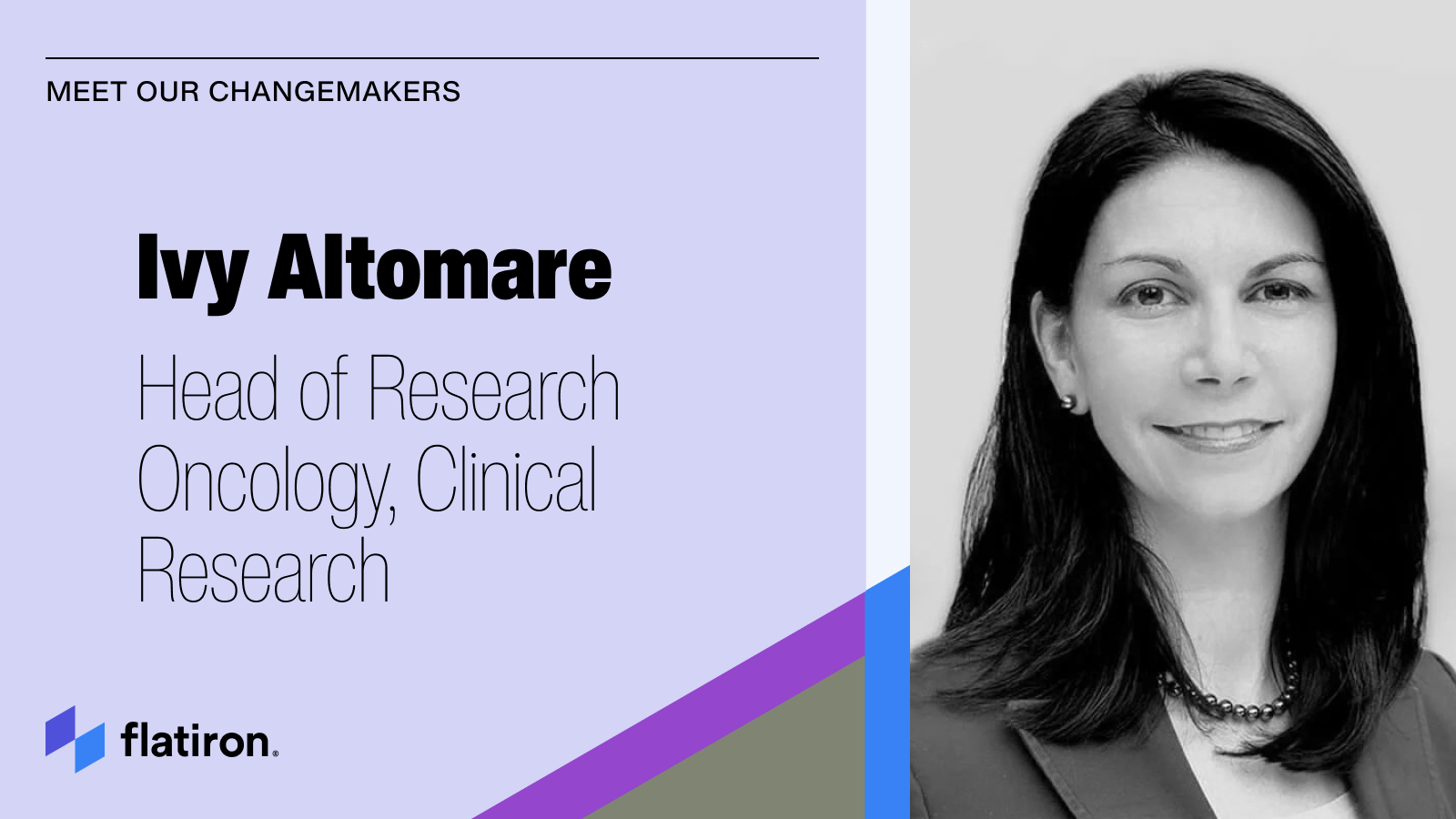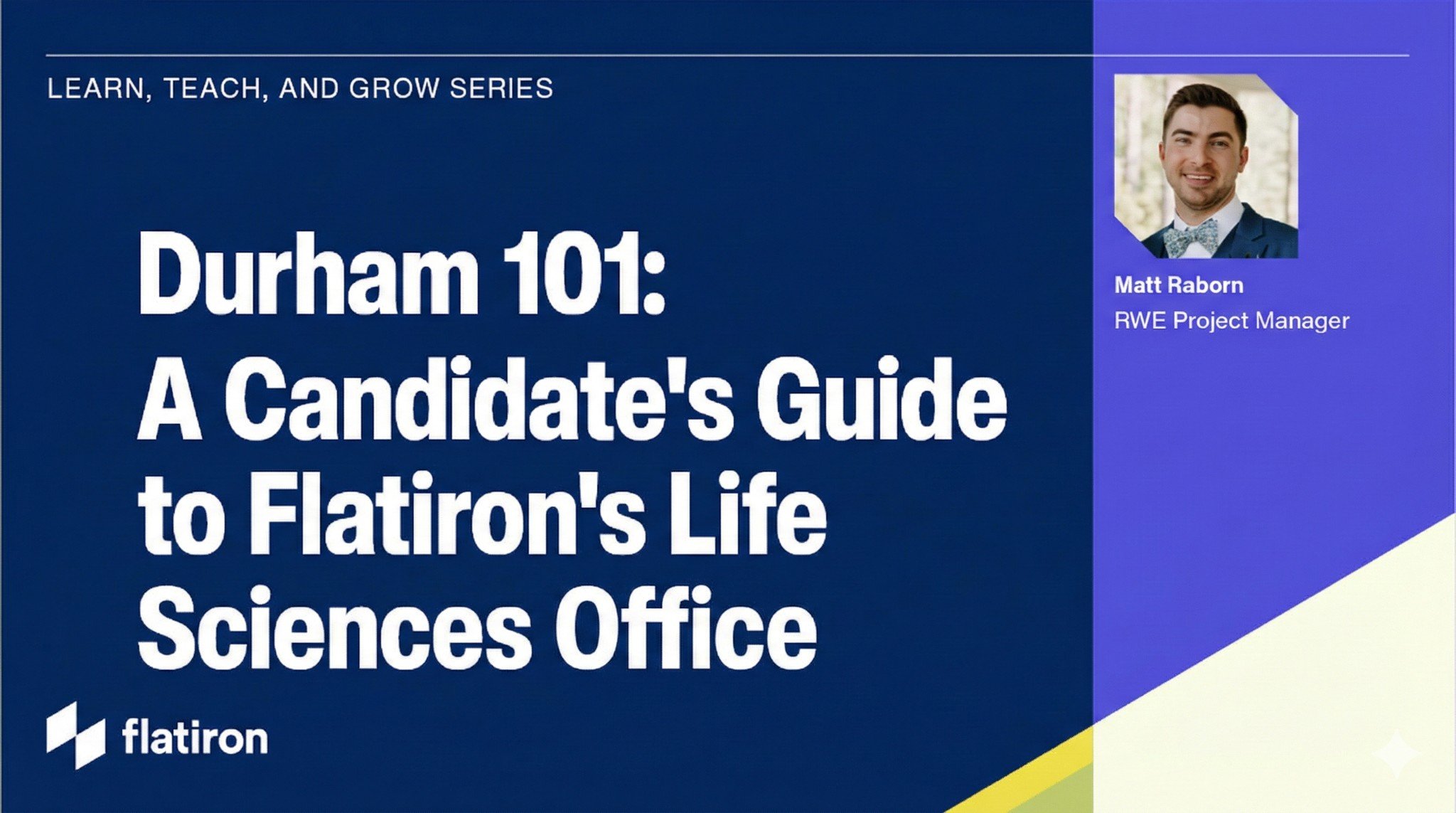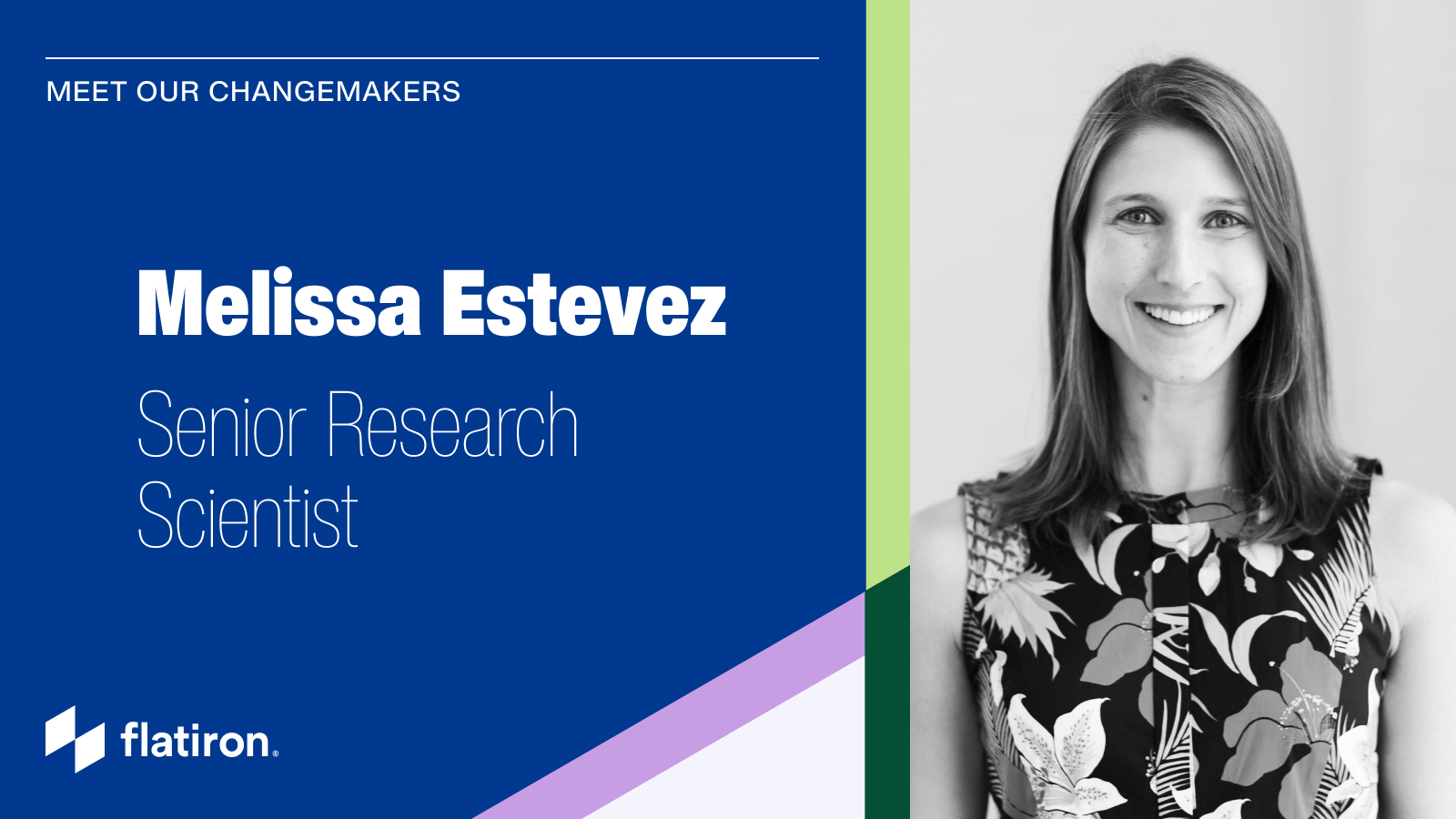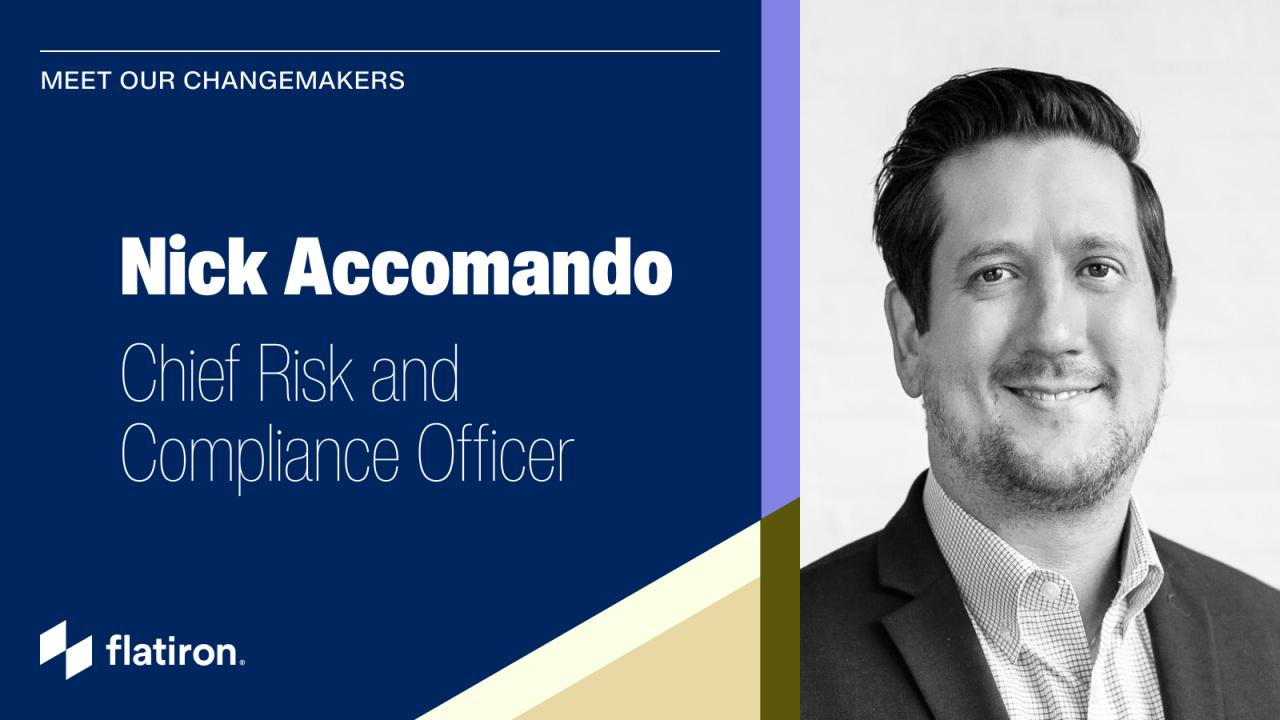At Flatiron Health, we believe that every employee has the power to make a difference. That’s why we are proud to shine a spotlight on our changemakers, the individuals who are driving meaningful impact across our organization and beyond. From engineering to clinical operations to data science and beyond, our changemakers are innovating, collaborating, and pushing boundaries to improve and extend the lives of people with cancer. In this series, we will introduce you to some of the remarkable individuals who make Flatiron Health a great place to work and a force for good in healthcare.
Meet Ivy Altomare, MD, Head of Research Oncology, Clinical Research at Flatiron Health. In this article, Ivy shares her experiences, motivations, and day-to-day work. She also discusses how her work in Oncology is making a significant impact on cancer research and care.
Q. Can you share with us the journey that led you to join Flatiron and your excitement about being part of the team that's now establishing our presence in the Research Triangle?
Prior to joining Flatiron Health in 2021, I was an Associate Professor at Duke University for over a decade where I was fortunate to serve as the Assistant Medical Director of the Duke Cancer Network, a rural outreach network supporting state-of-the-art clinical care and research in underserved communities across North Carolina. My position was a unique blend of community oncology practice, teaching and clinical research, and as Principal Investigator (PI) of numerous studies, I worked closely with Duke co-Investigators and dedicated staff to expand clinical research infrastructure and trial portfolios at Duke’s network of research sites and affiliates. Now, as the head of Research Oncology for Flatiron’s Clinical Research Business Unit (CRBU) and the Clinical Lead for the Flatiron Research Network, my role is similar, but the impact is exponential. Flatiron’s clinical research services and technologies strive to make cancer clinical trials more accessible, more efficient, and more representative and are utilized by study sponsors as well as a vast network of community and academic sites across the US. Of course, I’m biased, having lived here for the last 16 years, but I can think of no better place than the Research Triangle for an outpost of Flatiron’s NY headquarters. I have worked with teams that have spun Duke IP into biopharma startups, and have consulted for pharma sponsors and CROs in the Research Triangle area (and beyond). The skill, energy and drive of the talent here are palpable and the vibe is dynamic.
Q. What is your current location, and what has your experience been working with your teammates in a remote or hybrid work environment?
I live in Chapel Hill and have been a remote employee since I started at Flatiron. At first, I was apprehensive because, as a practicing oncologist, I felt that face-to-face interactions had been critical to maintain close and trusting relationships with my patients and their families, and even my co-workers, nurses, and research staff. However, I can honestly say that even from my first day at Flatiron, I have always felt just as close to my teammates over Zoom as I would if we were together in an office. This isn’t always the case for all remote employees and is a testament to the amazing, kind, enthusiastic, and talented people working at Flatiron.
Q. Provide an overview of the structure and dynamics of your team. How has this work contributed to our mission to learn from and extend the lives of every person with cancer?
My team of research oncologists are all clinicians, but we have different backgrounds and areas of expertise. Some of us (like me) served for years on faculty at academic centers conducting clinical and observational research and providing clinical care. Others have years of industry experience developing oncology drugs, designing and running global clinical trials within pharma or CROs, and overseeing patient safety and pharmacovigilance. And perhaps most importantly, we have experienced Research Nurses on our team who understand the needs and perspective of the actual end-users of many of our clinical trial products. In this way, my team brings a holistic perspective when directly supporting all of Flatiron’s cross-functional teams innovating, designing, and maintaining technology to accelerate cancer clinical research. We strive to inject the voice of the investigators, trial sponsors, site research teams, and of course, the patients, into everything we do.
Q. How has your experience as an oncologist working at Flatiron been unique from other professional experiences?
The scientific talent at Flatiron is truly unmatched, in my opinion, and there are so many opportunities for interesting collaborative research. It is invigorating to work with such a high concentration of prolific data scientists who are resourced specifically to tackle some of the most difficult and pressing challenges in cancer care today. For example, I have worked with Flatiron’s Health Equity team to examine mediators of racial/ethnic inequities in clinical trial participation, collaborated with investigators from the National Cancer Center Hospital East (NCCHE) in Japan to study differential outcomes among patients younger than 50 who develop metastatic colorectal cancer, and participated in an analysis to evaluate the ability of US EHR data to accelerate health technology appraisals in the UK. I am currently executing a research project together with the Association of Community Cancer Centers (ACCC) to study the characteristics of cancer clinical trials most attractive and well-suited to the community setting. We develop our scientific strategy in service to our business needs, collaborate with interesting external partners, and the research environment is the most dynamic and productive that I have ever experienced.
Q. How do you envision the Life Sciences Hub contributing to Flatiron Health's mission?
Again, I’m biased, but I’m excited to dip into the pool of talent that I know exists in the Research Triangle area as Flatiron expands to establish our Life Sciences Hub. As I stated before, I found the remote working environment to be surprisingly engaging, but when innovating, brainstorming and building new initiatives, there’s nothing like in person interactions, especially among cross-functional teams that span business development, clinical, data science, machine learning and engineering.
Q. What makes Flatiron stand out from other healthcare and tech companies in the area?
Hands-down, it’s our focus on oncology. All of us at Flatiron, no matter what job we have– people ops, IT, marketing, engineering, data science, product management– all of us work in direct service of millions of cancer patients every day. Whether it’s supporting OncoEMR® and our quality tools that help clinicians deliver state-of-the-art care or developing products to make clinical trials easier, faster, more powerful, and more inclusive, or building datasets that help develop more effective or less toxic cancer therapies, we all work in different ways in service to one shared mission. Flatiron is a company that understands that no two patients with cancer are completely alike and was founded on the principle that real patient experiences are precious resources that should not be wasted.
Q. Reflecting on your time at Flatiron, what's one specific aspect of our culture that you've found particularly valuable, and how do you envision fostering this in our new location?
One of our core values is “Learn, Teach, and Grow” and this sentiment is really taken to heart. Since my first day at Flatiron, I have been shocked at how much these tech people know about advanced oncology concepts! Flatiron is comprised of smart, motivated, enthusiastic professionals who truly care about our mission and our vision. Therefore, I feel that even though I’m no longer working in a medical environment, my non-clinical co-workers understand, for example, why immunotherapy has changed the landscape of cancer treatment for so many patients, or why comprehensive genomic profiling is critical for care delivery and clinical trial enrollment. Learning opportunities and professional development are a focus at all levels, from junior hires to senior leadership. As a manager myself, I have routine conversations with my reports about their personal and professional goals, and with the growth anticipated at the new Research Triangle Life Sciences Hub, it can only provide more opportunities for Flatiron team members to develop and advance.
Q. How significant is cross-functional collaboration in your daily work?
I can’t think of a workstream of mine that is not cross-functional, since as research oncologists, we primarily serve as clinical support for other functions, such as product, partnerships, scientific engagement, to name a few. One example of a cross-functional initiative would be Flatiron’s operational platform to scale pragmatically designed, tech-enabled Prospective Real World Studies in our Research Network. Observational studies can fill critical evidence gaps, like characterizing rare but important side effects of a new therapeutic class or studying effects of cancer treatment in racial/ethnic groups underrepresented pivotal Phase III trials. Flatiron clinicians and statisticians are pressure testing protocol designs which leverage and showcase our products for efficient study data capture and transfer. Our clinical operations and network teams are involved to optimize study operations and ensure network fit, guided by feedback from our Trials Advisory Board of investigators at the community oncology practices that use Flatiron’s EHR, OncoEMR. So, this sprint is shaped by collaborative feedback from diverse disciplines, both within and outside of Flatiron.
Q. If you were to offer one piece of advice to a candidate interested in interviewing for your team, what would it be?
To any clinician, and specifically candidates from academia, I would say you don’t have to have a tech background to thrive at a tech company!




